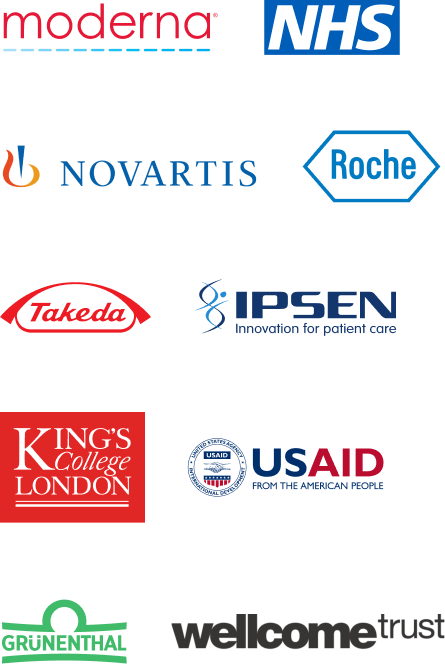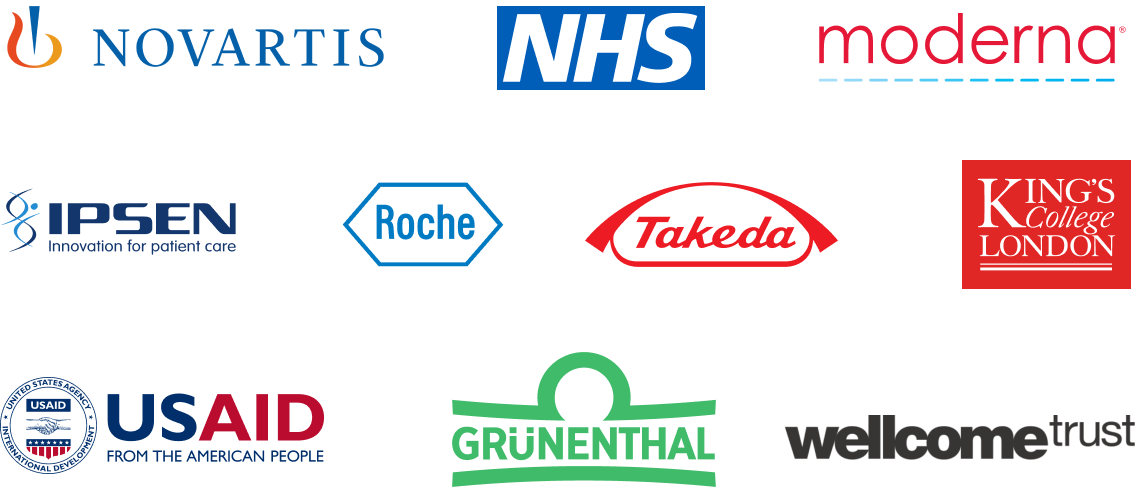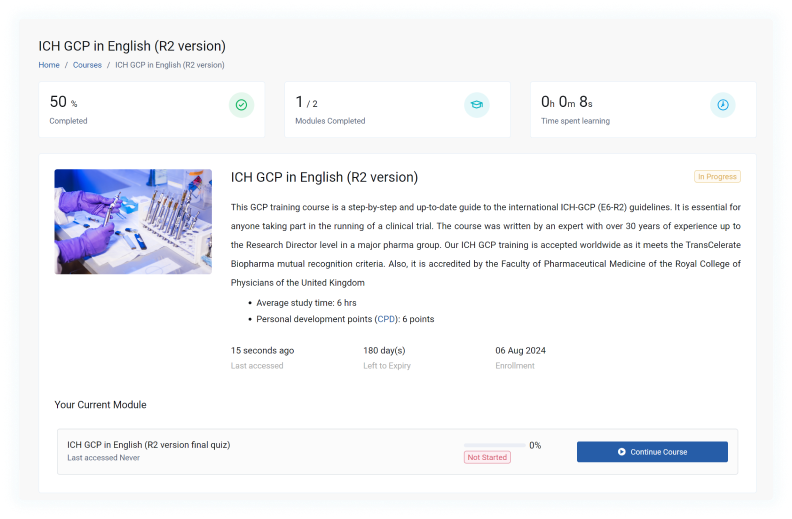Course Syllabus
- What is GCP?
- Why is ICH GCP Important?
- The Principles of ICH GCP
- Additional Learning Points
- Documentation and Version Control
- Quality Assurance (QA)
- Key Resources
- Introduction
- Responsibilities of the CA
- Responsibilities of the IEC
- Subject Informed Consent Forms (ICF): Part 1
- Subject Informed Consent Forms (ICF): Part 2
- Composition, Functions, Operations, Procedures, and Records
- Introduction
- Investigator Responsibilities
- Investigator Qualifications and Agreements
- Adequate Resources
- Medical Care of Trial Subjects: Part 1
- Medical Care of Trial Subjects: Part 2
- Communication with IRB/IEC
- Compliance with the Protocol
- Investigational Medicinal Products
- Randomisation Procedures and Un-blinding
- Informed Consent of Trial Participants: Part 1
- Informed Consent of Trial Participants: Part 2 - The Debate on Consents
- Informed Consent of Trial Participants: Part 3 - Obtaining Consent of Subjects Who Cannot Read or Write
- Informed Consent of Trial Participants: Part 4 – Obtaining Consent of Minors and “Mentally Incompetent” Subjects
- Informed Consent of Trial Participants: Part 5 – Obtaining Consent: Incapacitated Subjects
- Informed Consent of Trial Participants: Part 6 – Obtaining Consent: Updating Consent
- Records and Reports: Part 1 - Introduction
- Records and Reports: Part 2 - Study Site Files
- Records and Reports: Part 3 - Updates & Amendments
- Records and Reports: Part 4 - Source Documents
- Records and Reports: Part 5 - Financial Information
- Records and Reports: Part 6 - The Case Record Form
- Records and Reports: Part 7 - Recording Subject Data
- Premature Termination of a Trial
- Progress Reports and Final Reports by Investigator
- Archiving
- Introduction
- Quality Management: Part 1
- Quality Management: Part 2
- QA and QC (Quality Assurance and Quality Control): Introduction
- QA and QC (Quality Assurance and Quality Control): Standard Operating Procedures
- QA and QC (Quality Assurance and Quality Control): Agreements & Contracts
- Contract Research Organisations
- Trial Design
- Trial Management, Data Management, and Record Keeping: Part 1 – Research Management
- Trial Management, Data Management, and Record Keeping: Part 2
- Trial Management, Data Management, and Record Keeping: Part 3
- Trial Management, Data Management, and Record Keeping: Part 4 – Electronic Data Systems
- Trial Management, Data Management, and Record Keeping: Part 5 – Record Keeping
- Investigator Selection: Introduction
- Investigator Selection: Permissions
- Investigator Selection: Responsibilities
- Investigator Selection: Compensation
- Financing
- Notification/ Submission to Regulatory Authorities
- Gaining CA Approval in the EU
- Confirmation of Review by IRB/IEC
- Information on IMP
- Manufacturing, Packaging, Labelling, and Coding Investigational Products: Part 1
- Manufacturing, Packaging, Labelling, and Coding Investigational Products: Part 2
- Supplying and Handling Investigational Products
- Record Access
- Audit and Inspection
- Noncompliance
- Premature Termination or Suspension of a Trial
- Clinical Trial/Study Reports
- Multicentre Trials
- Introduction
- Monitoring: Part 1
- Monitoring: Part 2 – Monitor Responsibilities
- Monitoring: Part 3 - The Follow-up Visit
- Monitoring: Part 4 – Review of the Investigational Medicinal Product
- Monitoring: Part 5 – Complying with the Protocol, Amendments, SOP and Guidance
- Monitoring: Part 6 - Verifying Informed Consent
- Monitoring: Part 7 - The Case Record Form (CRF) and Source Documents
- Monitoring: Part 8 - Verifying Subject Data
- Monitoring: Part 9 – Errors
- Monitoring: Part 10 – Completion of the Monitoring Visit
- The Monitoring Report & Plan
- Quality Management - Centralised Monitoring
- Fraud and Misconduct
- Introduction
- Adverse Drug Reaction Reports: Part 1 – Adverse Events (AEs)
- Adverse Drug Reaction Reports: Part 2 – Serious Adverse Events (SAE)
- Adverse Drug Reaction Reports: Part 3 – Suspected, Unexpected, Serious Adverse Drug Reaction
- Adverse Drug Reaction Reports: Part 4 – Adverse Events of Special Interest
- Adverse Drug Reaction Reports: Part 5 – Periodic Safety Reports
- Adverse Drug Reaction Reports: Part 6
- Introduction
- Protocol Structure and Content
- Introduction
- Investigator Brochure Structure and Content
- Introduction
- Essential Documents
- Archiving
- Documents to be Present Pre-Study
- Documents to be Present During the Study
- Documents to be Present Post-Study
- Introduction
- What are the Differences to ICH-GCP?
- Examiner and Test Groups: Part 1
- Examiner and Test Groups: Part 2
- Examiner and Test Groups: Part 3
- Application and Approval Procedure
- Glossary & Abbreviations
- Useful Reference Documents List
Our GCP certified customers


Good Clinical Practice (GCP) training is a vital educational programme designed to arm clinical trial professionals and researchers with essential knowledge about ethical and scientific standards. These standards are crucial for conducting clinical trials of the highest quality. The training encompasses the globally recognised guidelines set forth by the International Council for Harmonisation (ICH).
The key objectives of GCP training include:
- Safeguarding the rights, safety, and welfare of human participants
- Upholding the accuracy and reliability of data collected during clinical trials
- Fostering uniform, top-tier practices across all facets of clinical research
Whitehall Training's Good Clinical Practice Course thoroughly explores these critical areas, offering learners a robust grounding in both the theoretical principles and practical applications of Good Clinical Practice. Our comprehensive course ensures that participants gain a deep understanding of these crucial aspects, preparing them for the complexities of modern clinical research.
Absolutely. For those involved in clinical trials research, GCP certification is essential. However, even if you're simply looking to broaden your knowledge of the field, obtaining GCP certification offers significant advantages:
- It demonstrates your commitment to upholding global standards
- Your research gains increased credibility and quality
- You'll be better equipped to safeguard the rights and wellbeing of trial participants
- Your career prospects in clinical research can be substantially improved
Our Good Clinical Practice course at Whitehall Training goes beyond mere certification. We provide you with the practical know-how to effectively implement GCP principles in your day-to-day work. This hands-on approach ensures you're not just certified, but truly competent in applying GCP standards.
Which professionals require Good Clinical Practice training?
Good Clinical Practice (GCP) certification is crucial for a broad spectrum of individuals working in clinical research:
- Lead and co-investigators: Those with primary responsibility for overseeing and conducting trials at research facilities.
- On-site trial team members: This includes research coordinators, clinical nurses, and other personnel involved in the day-to-day management of trials.
- Trial sponsors and outsourced research firms: Professionals responsible for the overall planning, initiation, and reporting aspects of clinical trials.
- Regulatory body representatives: Officials tasked with monitoring and assessing compliance within trials.
- Ethics committees and review boards: Members involved in the evaluation and approval of trial protocols.
- Staff at research institutions and universities: Individuals ensuring that institutional research adheres to international standards.
- Researchers funded by national health bodies: All staff and investigators participating in clinical trials supported by national health research funding.
Our comprehensive GCP course is designed to cater to this wide-ranging audience, offering both fundamental GCP principles and role-specific guidance. Additionally, it's an excellent resource for anyone seeking to enhance their research capabilities and streamline their clinical trial operations.
The course also provides valuable insights into the nuances of conducting clinical trials in Germany, offering a deeper understanding of the local regulatory landscape and market-specific considerations.
Our Good Clinical Practice training programme is designed to provide comprehensive coverage of the ICH-GCP (E6-R2) international guidelines, ensuring you meet the necessary requirements for participation in global clinical trials. We offer this course in multiple languages to cater to a diverse audience.
The content serves as a thorough, up-to-date guide to the ICH-GCP (E6-R2) guidelines, making it an indispensable resource for all individuals involved in clinical trial management. Our course material has been developed by an industry veteran with over three decades of experience, including a tenure as Research Director at a leading pharmaceutical company.
We're proud to offer a course that's been accredited by the Faculty of Pharmaceutical Medicine of the Royal College of Physicians in the UK. To accommodate our international learners, we've made the course available in ten languages, including English, German, Bulgarian, French, Italian, Japanese, Polish, Portuguese, Russian, and Spanish.
Understanding that regulatory frameworks can vary, we've also created region-specific versions of the course. These tailored editions are available for Australia, the UK, the US, France, Germany, and Latin America, ensuring learners receive information relevant to their specific market.
The course boasts a user-friendly format with clear visuals, facilitating easy reference to the ICH-GCP E6 document. Drawing from the author's wealth of experience, it offers practical insights into the real-world application of Good Clinical Practice principles. As an added benefit, participants can earn 6 CPD points upon completion.
By choosing our GCP course, you're investing in a high-quality, accredited programme that combines theoretical knowledge with practical application, preparing you thoroughly for your role in clinical trials.
Indeed, our GCP course has received certification from a prestigious body in the UK. The Faculty of Pharmaceutical Medicine at the Royal College of Physicians has granted their seal of approval to our training programme. This organisation is renowned for its commitment to maintaining exceptional standards in pharmaceutical research since its establishment in 1989.
By obtaining this certification, we've demonstrated that our course content aligns with the most stringent industry and academic benchmarks. This means that when you complete our GCP training, you'll receive a qualification that's widely acknowledged and respected across the pharmaceutical sector.
The certification process ensures that the information we provide is not only accurate and up-to-date but also meets the exacting requirements set forth by leading professionals in the field. This gives you the confidence that the knowledge you gain from our course is of the highest calibre and directly applicable to your work in clinical research.
The price of GCP certification can vary substantially based on several key factors:
- Official recognition: Does the course have approval from reputable organisations?
- Compliance with standards: Is the training aligned with ICH guidelines, allowing participation in global clinical trials?
- Content relevance: Is the material current and developed by industry professionals?
- Duration of availability: For how long can students access the course materials?
At Whitehall Training, we offer our comprehensive GCP course for £79. This competitive price reflects:
- Our accreditation by the esteemed Royal College of Physicians, which awards 6 CPD points upon completion.
- Full compliance with ICH E6(R2) guidelines, ensuring participants are prepared for international clinical trials.
- Expert-crafted content by Lucy Parker, our GCP specialist with over 10 years of experience leading research in major institutions like the NHS.
- Unlimited access to course resources, supporting continuous professional development.
For group bookings, we provide a 10% discount when purchasing 5 licences at checkout. If you're interested in larger group rates, please contact our team for a tailored quote.
Indeed, one can find some GCP training options at no cost. However, it's important to be aware of their potential drawbacks:
- The content may lack accreditation and could be outdated
- They typically don't offer an official certificate, which is often necessary for conducting clinical research
That being said, these complimentary courses can serve a purpose. For those seeking a basic introduction to Good Clinical Practice, they can be a valuable starting point.
Whitehall Training's GCP course offers a comprehensive exploration of the crucial elements required for executing ethical and scientifically rigorous clinical trials. Our programme is thoughtfully structured to cater to both newcomers and seasoned professionals in the field.
The curriculum encompasses a wide range of essential subjects, including:
-The evolution and core tenets of GCP
-Key stakeholder duties in clinical research
-Ethical frameworks and participant consent procedures
-Study blueprint creation and compliance
-Vigilance in safety monitoring and incident handling
-Upholding data accuracy and quality standards
-Navigating regulatory landscapes
-Crucial paperwork and archival practices
-Proper management of investigational medicines
-Effective site administration and oversight techniques
We've crafted an engaging learning journey through various e-learning approaches:
-In-depth educational materials
-Authentic industry scenarios
-Engaging knowledge assessments
-Practical insights and recommended methodologies
-Reflective exercises for personal growth
This meticulously designed course ensures that participants gain a robust understanding of GCP principles, equipping them with the knowledge and skills necessary for excellence in clinical research.
Acquiring your Good Clinical Practice certificate is a simple two-stage process:
- Work through our engaging, interactive course materials to complete the learning component.
- Take the online final assessment.
Feeling apprehensive about the GCP assessment? There's no need to worry. The exam is merely a necessary step to confirm your readiness for research participation. In the unlikely event that you don't pass on your first attempt, you can easily revisit any areas where you need additional understanding using our comprehensive resource library, and then retake the assessment.
Our aim at Whitehall Training is to ensure you're well-prepared for your role in clinical research, not to catch you out. We've designed the course and assessment to be informative and achievable, helping you gain the knowledge you need with confidence.
Our Good Clinical Practice course is structured to ensure participants not only absorb the material but can effectively implement it in real-world clinical research environments. The assessment strategy is multi-faceted:
-Continuous Evaluation: As learners progress through the modules, they'll encounter interactive quizzes and practical scenarios. These serve to solidify key concepts and provide immediate feedback on understanding.
-Comprehensive Final Test: The course concludes with an in-depth examination that thoroughly evaluates the learner's understanding of GCP principles and their practical application. This test covers a broad spectrum of topics, including:
-Ethics in clinical studies
-Regulatory compliance and requirements
-Key roles and their responsibilities in clinical trials
-Maintaining data integrity and quality
-Proper handling and reporting of safety concerns and adverse events
-Real-world Application: The final test incorporates questions that challenge learners to apply GCP principles to lifelike clinical trial situations, bridging the gap between theory and practice.
To ensure all participants are adequately prepared for their roles in clinical trials, passing the final test is a prerequisite for obtaining GCP certification.
We understand that learning takes time, which is why learners can attempt the final test as many times as needed. This approach ensures that everyone can achieve the required level of competence and become GCP qualified at their own pace.
Our Good Clinical Practice (GCP) course is crafted to accommodate a diverse range of professionals engaged in clinical research. Whilst prior knowledge of clinical research can be advantageous, it's not essential for enrolment. We've thoughtfully structured the content to suit varying levels of expertise and different roles within the clinical trial field.
This training proves especially beneficial for:
- Research Nurses
- Clinical Trial Managers
- Principal and Sub-Investigators
- Clinical Research Coordinators
- Quality Assurance Specialists
- Data Managers and Biostatisticians
- Pharmacists involved in clinical trials
- Ethics Committee Members
- Regulatory Affairs Professionals
- Sponsors and Contract Research Organisation (CRO) staff
Whether you're embarking on your clinical research journey or seeking to update your existing knowledge, our course offers a thorough exploration of GCP principles and their real-world application. The curriculum is designed to be accessible yet comprehensive, ensuring that all participants, regardless of their background, can grasp and apply the crucial concepts of Good Clinical Practice.
Yes, our Good Clinical Practice (GCP) course is fully online, providing learners with unparalleled convenience and adaptability. The digital format offers several key benefits:
-Flexible learning: Students can tackle the course content at their own speed, aligning with their personal learning preferences and daily commitments. This approach fosters a more thorough understanding of the material without the constraints often associated with traditional classroom settings.
-Unrestricted availability: The course is accessible round-the-clock via any internet-enabled device. Whether you're at your workplace, in the comfort of your home, or on the move, you can engage with the course material whenever it suits you best.
This online approach ensures that professionals can efficiently integrate their GCP training into their busy schedules, making it easier to stay current with essential clinical research practices.
The International Council for Harmonisation, or ICH, plays a crucial role in shaping the landscape of pharmaceutical research and development worldwide. This collaborative body:
- Unites regulatory authorities with industry experts
- Establishes globally recognised benchmarks for clinical trials
- Prioritises participant safety and data reliability in its GCP guidelines
- Regularly updates its standards, with ICH GCP E6(R2) being the most recent iteration
Adherence to these ICH guidelines is essential for conducting clinical trials that meet international requirements. Our Good Clinical Practice course at Whitehall Training has been meticulously designed to cover all 13 fundamental ICH GCP principles in depth. This comprehensive approach ensures that you'll be well-equipped to carry out research that aligns with global standards, including specific insights into the German market where relevant. By mastering these principles, you'll be prepared to navigate the complexities of clinical research with confidence and competence.
ICH Good Clinical Practice E6 (R2) is the latest version of the GCP guidelines, published in 2016 by the International Council for Harmonisation of Technical Requirements for Pharmaceuticals for Human Use. This update marks a substantial progression in GCP standards, adapting to the evolving nature of clinical research.
It's essential for clinical research professionals to be well-versed in ICH GCP E6 (R2) for several reasons:
It sets the current worldwide benchmark for ethical and scientifically rigorous clinical trials.
Regulatory bodies across the globe often mandate adherence to these guidelines.
It plays a vital role in safeguarding human participants and ensuring the credibility of trial results.
Many research institutions and pharmaceutical companies expect their teams and collaborators to be knowledgeable about and follow these updated guidelines.
The Whitehall Training Good Clinical Practice Course offers comprehensive coverage of ICH GCP E6 (R2). Our course is designed to equip learners with a thorough understanding of these updated guidelines, enabling them to implement them effectively in their clinical research roles. By completing our course, participants will be well-prepared to meet the current standards expected in the field of clinical research.
The International Council for Harmonisation (ICH) Good Clinical Practice (GCP) guidelines are underpinned by 13 essential principles that form the backbone of ethical and scientific standards in clinical research. These crucial principles encompass:
Upholding ethical standards
Ensuring benefits surpass risks
Safeguarding participants' rights and well-being
Providing comprehensive supporting evidence
Developing scientifically robust protocols
Obtaining Institutional Review Board (IRB) or Independent Ethics Committee (IEC) approval
Maintaining qualified medical oversight
Engaging competent investigators
Securing informed consent
Ensuring precise data documentation and reporting
Preserving confidentiality
Adhering to good manufacturing practices for investigational products
Implementing quality assurance systems
The Whitehall Training Good Clinical Practice course offers a comprehensive exploration of these principles, equipping learners with the knowledge to effectively implement them in practical clinical research scenarios. Our course delves into each principle, providing context and real-world examples to enhance understanding and application.

